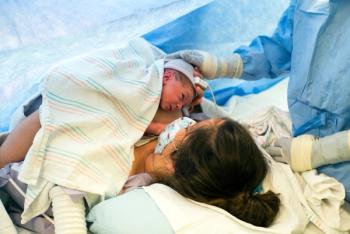
Following voluntary market withdrawal from Covis Pharma, the FDA has decided to withdraw the approval of Makena and its generics for reducing the risk of preterm birth.


Following voluntary market withdrawal from Covis Pharma, the FDA has decided to withdraw the approval of Makena and its generics for reducing the risk of preterm birth.

A new Philadelphia initiative was developed to lower cases of severe childbirth complications.

In a recent study, patients with a history of hypertensive disorders of pregnancy were at greater risk of developing any stroke, ischemic stroke, and hemorrhagic stroke later in life.

In a recent study, a panel of experts came to a consensus on the definition of cesarean scar disorder, along with symptoms and criteria of the condition.

Patricia Hunt, BS, MS, PhD, discusses how prenatal development is impacted by parental age, along with the significance of researching this association.

In a recent study, decreasing rates of cesarean delivery were found among low-risk patients during the latter years of a 2000 to 2019 study period.

In a recent study, states enacting a 20-week abortion ban from 2011 to 2018 had increased rates of neonatal Down Syndrome diagnoses.

Multiple studies have indicated a greater risk of neonatal morbidity and mortality when births occur in out-of-hospital settings.

In a recent study, women who underwent medically-assisted reproduction were more likely to experience negative psychiatric effects because of remaining childless after treatment.

In a recent study, Black and Hispanic patients were more likely to experience postpartum emergency department care.

In a recent study, active management for early pregnancy loss, also known as miscarriage, was seen less often in emergency departments compared to outpatient clinics.

For preterm infants, clinical outcomes from microbial mechanisms are not affected by a diet of only human milk compared to bovine milk formulas or fortifiers.

At the 44th National Association of Pediatric Nurse Practitioners Conference, evidence-based approaches for supporting pregnant adolescents were discussed.

Nearly 59% of an infant’s microbiota composition is transferred by their mother.

Interventions before and after birth can reduce the rising maternal mortality ratio.

In a recent study, worse neurodevelopmental outcomes were seen in children born preterm and with postnatal growth failure.

For pregnant women at high risk of preeclampsia, aspirin discontinuation at 24 to 28 weeks’ gestation was comparable to aspirin continuation for preventing preterm preeclampsia, according to recent clinical trial data.

A recent study highlights barriers to pregnancy prevention for women without permanent housing.

A booster dose of mRNA COVID-19 vaccination during pregnancy increases protection of infants from infection and related hospitalization.

A new study offers insights into future guidelines for certain populations of pregnant women during a national pandemic.

Both undertreatment and overtreatment were common in this cohort of penicillin-allergic pregnant women with Group B Streptococcus (GBS).

Brian Grosberg, MD, and Stephanie Bakaysa, MD, of Hartford HealthCare Medical Group, offered their clinical perspectives on the recently published survey study on management for migraines during pregnancy.

A genome-wide genetic association study using mendelian randomization provides insight into the causal relationships between HDPs and coronary artery disease and ischemic stroke later in life.

In doing so, the country met the new target of the World Health Organization.

In ProgenyHealth’s 2023 key trends and insights report, vital areas to observe in pregnancy and childbirth are discussed.